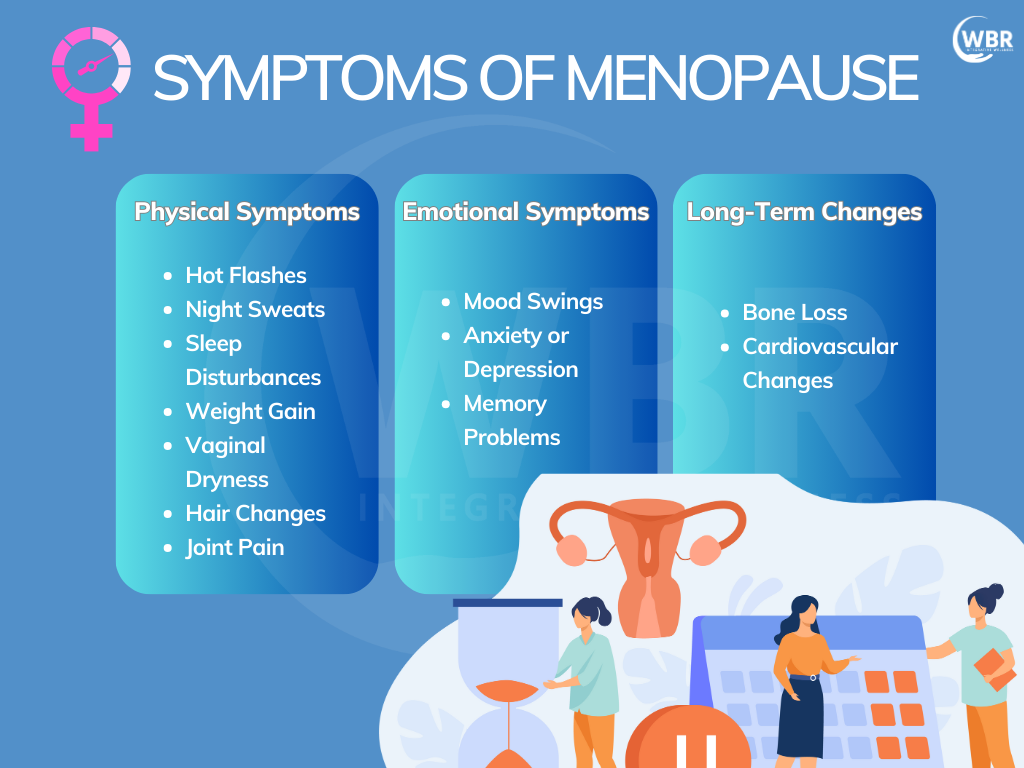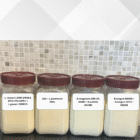Functional Medicine Approach for Menopause
Menopause is a natural transition that marks the end of a woman’s reproductive years, typically occurring between ages 45 and 55. Far from being a disease, it is a normal phase of life experienced by over 1.1 billion women worldwide. However, this transition often comes with challenges such as hormonal imbalances, hot flashes (affecting up to 75% of women), mood changes, weight gain, and sleep disturbances. These symptoms disrupt daily life and emotional well-being.
Functional medicine provides a holistic and personalized approach to managing menopause. By focusing on root causes, it integrates nutrition, lifestyle adjustments, and targeted therapies to restore balance and improve long-term health. Instead of merely alleviating symptoms, functional medicine empowers women to navigate menopause with vitality, addressing the unique needs of each individual. This blog explores how a functional medicine approach helps transform menopause from a struggle into an opportunity for renewed health and well-being.
Understanding Hormonal Balance in Menopause
Navigating menopause successfully requires a deep understanding of hormonal balance. This phase of life brings significant changes to hormone production, but with the right knowledge, it is embraced with confidence.
1. Ovarian Decline and Hormonal Shifts
- Reduced Estrogen Production: During menopause, the ovaries slow down estrogen production. The adrenal glands and body fat step in as secondary sources, but the supply often isn’t enough to maintain balance.
- The Hormonal Trio: A healthy balance between estrogen, progesterone, and thyroid hormones is crucial. Imbalances lead to common symptoms like hot flashes, mood swings, and fatigue.
2. The HPATG Axis: A Hormonal Network
- What is the HPATG Axis?: The Hypothalamus, Pituitary, Adrenal, Thyroid, and Gonadal hormones form a complex network that governs everything from energy to emotional stability.
- Interconnected Harmony: When one hormone shifts, it affects the others, leading to the symptoms many women face during menopause.

Bioidentical Hormone Replacement Therapy (BHRT)
Bioidentical Hormone Replacement Therapy (BHRT) offers a natural and effective way to manage menopausal symptoms by restoring hormonal balance with hormones that are structurally identical to those produced by the body. This approach is often preferred due to its personalized nature and fewer side effects compared to synthetic hormones.
Why Consider BHRT?
Menopause often brings a range of symptoms and health risks, such as hot flashes, cognitive decline, and an increased risk of coronary artery disease (CAD). BHRT helps reduce these symptoms while potentially lowering associated health risks. Its natural composition often results in better tolerance and fewer side effects, making it a favorable option for many women.
Key Components of BHRT
- Estrogen: Alleviates hot flashes, improves cognitive function, and supports overall well-being.
- Progesterone: Balances estrogen levels, enhances sleep quality, and reduces the risk of endometrial hyperplasia, a condition linked to unopposed estrogen.
Administration Methods
- Non-Oral Forms: Gels and patches are commonly used to deliver estrogen, reducing risks associated with blood clotting that are sometimes linked to oral forms.
- Oral Progesterone: Ideal for nighttime use, it helps improve sleep while balancing hormones effectively.
A Personalized Approach
The cornerstone of BHRT is its customization. Functional medicine practitioners tailor treatments based on an individual’s family history, overall health, and specific symptoms. This personalized strategy ensures the therapy is both safe and effective, helping women achieve a better quality of life during and after menopause.
By integrating BHRT with lifestyle changes and nutritional support, functional medicine empowers women to navigate menopause with confidence and optimal health.
Nutrition and Supplements for Menopause Management
A balanced diet and targeted supplementation significantly ease menopausal symptoms and support overall well-being. Incorporating specific nutrients and herbs helps restore hormonal balance and improve quality of life during this transitional phase.
1. Phytoestrogens for Hormonal Balance
- Soy Isoflavones: These plant-based compounds mimic estrogen in the body, stabilizing estrogen receptor sensitivity. Include high-quality soy products like tofu, tempeh, or fermented soy for better digestion and hormonal support.
- Flaxseed: Rich in omega-3 fatty acids and lignans, flaxseed supports hormonal stability. Aim for 2 tablespoons of ground flaxseed daily to enhance hormone regulation and reduce menopausal symptoms.
2. Essential Vitamins and Minerals
- Vitamin D3 and K: These vitamins work together to strengthen bones, reduce the risk of osteoporosis, and boost overall vitality.
- Magnesium: A vital mineral that promotes relaxation, improves sleep quality, and alleviates hot flashes. Add magnesium-rich foods like nuts, seeds, and dark leafy greens, or consider a supplement if needed.
3. Adaptogens and Herbal Support
- Maca Root: Known for its adaptogenic properties, maca helps balance hormones post-menopause and boosts energy levels. It’s a versatile herb that can be added to smoothies or taken as a supplement.
- Black cohosh: It is a herbal remedy known to alleviate menopause symptoms like hot flashes, mood swings, and sleep disturbances by supporting hormonal balance and reducing inflammation.
Incorporating these nutrients and supplements into a functional medicine approach creates a strong foundation for managing menopause. Combined with lifestyle changes, these strategies empower women to navigate menopause with confidence and improved health.
Lifestyle Adjustments for Holistic Menopause Management
Lifestyle changes play a crucial role in managing menopausal symptoms and improving overall well-being. Adopting healthy habits helps women navigate this transition with greater ease and vitality.
1. Dietary Changes
A low-glycemic diet rich in proteins, healthy fats, and whole foods stabilizes blood sugar levels and reduces symptom triggers. Minimize processed foods, alcohol, and caffeine, as these worsen hot flashes and mood swings. Incorporate hormone-supporting foods like ground flaxseed, green tea, and whole grains to enhance overall balance.
2. Exercise and Physical Activity
Regular exercise supports bone density, hormonal health, and stress management. Strength training and Whole-Body Vibration Therapy (WBVT) are excellent for maintaining bone strength, while low-impact activities like yoga, Pilates, and walking promote stress relief and muscle recovery. Aim for a mix of activities that balance physical fitness with relaxation.
3. Stress Management
Managing stress is key to maintaining hormonal harmony. Mindfulness practices, meditation, and deep breathing exercises calm the nervous system and reduce cortisol levels. Supporting adrenal health with moderate exercise and relaxation routines further enhances resilience against stress.
By integrating these lifestyle adjustments with a holistic approach, women are able to achieve better health outcomes and thrive during menopause and beyond.
Testing and Personalized Interventions
Comprehensive testing is a cornerstone of functional medicine for menopause management, allowing for tailored interventions that address individual needs.
1. Key Tests for Hormonal Insights
- Thyroid Panel: Includes TSH, Free T4, Free T3, Reverse T3, and Thyroid Antibodies (TPO/Tg) to evaluate thyroid function and detect imbalances.
- DUTCH Test: Provides a detailed analysis of cortisol patterns and adrenal function, offering insights into stress levels and sleep issues.
- Metabolic Health Tests: Blood tests for insulin, HbA1c, and glucose tolerance assess metabolic health and identify risks for diabetes or insulin resistance.
2. Interpreting Lab Results for Personalized Care
- Tailored Treatments: Test results guide the development of personalized treatment plans, targeting the root causes of symptoms.
- Collaborative Approach: Working with a functional medicine practitioner ensures interventions are customized to your specific hormonal profile, lifestyle, and health goals.
By leveraging comprehensive testing, functional medicine empowers women to achieve optimal health and thrive during menopause.
Holistic Hormone Health Strategies
- Liver and Gut Health
Supporting liver and gut function is essential for detoxifying excess hormones. A diet rich in cruciferous vegetables (e.g., broccoli, kale) and fiber promotes estrogen clearance, while probiotics and fermented foods improve gut microbiome balance. Limiting alcohol and processed foods enhances liver efficiency. - Stress and Sleep Management
Chronic stress and poor sleep exacerbate hormonal imbalances. Adaptogens like ashwagandha and rhodiola help regulate cortisol levels, while mindfulness practices such as meditation or yoga reduce stress. Prioritizing restorative sleep through bedtime routines and limiting blue light exposure is equally critical. - Tracking and Education
Journaling symptoms, such as hot flashes and mood changes, helps identify patterns and measure progress. Dietary changes, environmental toxin exposure, and hormone testing (e.g., DUTCH or thyroid panels) empowers oneself to make informed, sustainable decisions for managing menopause.
Practical Tips for Everyday Menopause Management
Implementing small, consistent changes help ease menopausal symptoms and support overall well-being. Here are practical tips to incorporate into your daily routine:
1. Dietary Tips
- Protein-Rich Breakfast: Kickstart your day with a breakfast rich in protein to stabilize blood sugar and boost energy.
- Flaxseed for Hormonal Support: Add 2 tablespoons of ground flaxseed to smoothies, yogurt, or oatmeal to promote hormonal balance and improve digestion.
2. Supplements for Symptom Relief
- Targeted Combinations: Look for supplements containing isoflavones, lignans, and adaptogenic herbs to support hormonal health.
- Recommended Brands: Consider options like Thorne’s Meta Balance, Xymogen’s MenoFem, or Pure Encapsulations PhytoBalance for quality and effectiveness.
3. Lifestyle Practices
- Limit Stimulants: Reduce caffeine and alcohol intake to minimize symptom triggers like hot flashes and mood swings.
- Exercise Regularly: Incorporate strength training, Whole-Body Vibration Therapy (WBVT), and moderate exercises like walking to maintain bone density and hormonal balance.
These simple yet impactful tips make everyday menopause management more manageable and empowering.

Conclusion
Managing menopause doesn’t have to be a struggle. A functional medicine approach, with its focus on personalized care, nutrition, supplements, and lifestyle adjustments, offers a holistic way to address menopausal symptoms and support long-term well-being. By prioritizing dietary choices, incorporating targeted supplements, and committing to regular exercise and stress management, women restore hormonal balance and improve overall health. Embracing these strategies empowers women to experience menopause as a transition full of potential rather than a challenge, ensuring a vibrant, balanced, and healthy life during and beyond this phase.









